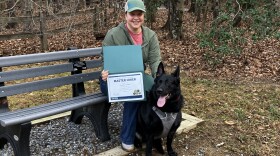Two Richmond-based authors are challenging businesses and organizations to address bias in the workplace. In the book Erasing Institutional Bias, they identify different types of bias, its negative impacts and positive ways society can respond. For Virginia Currents WCVE’s Yasmine Jumaa has more.
Transcript:
Biases come in many shapes and forms, they exist in everyone, and are embedded into institutions.
Tiffany Jana: Gender bias, racial bias, hiring and advancement bias.
Tiffany Jana is the founder of TMI Consulting, who identifies with they-them pronouns.
Early-on in their career, Jana encountered multi-layered forms of bias.
Jana: If I walked into a room and I did have seniority or authority, it was never really assumed. Sometimes people assume that women aren't in charge or that young people aren't in charge or that black people aren't in charge.
Jana is the co-author of the 2016 book Overcoming Bias: Building Authentic Relationships Across Differences. Their latest book Erasing Institutional Bias: How to Create Systemic Change for Organizational Inclusion was co-authored with Ashley-Diaz Mejias.
Diaz-Mejias: I think we have to look at the ways that our policies isolate. We have to look at the ways that our economic structures isolate. We've just been doing this for so long that is so embedded in the way that our nation operates.
Diaz-Mejias and Jana devote two chapters to retribution bias, which favors punishment of individuals over relationships. The authors point to both the U.S. criminal justice system and the reentry process.
Jana: The Biases that we’ve embedded into our systems don't allow people to participate fully as citizens, as residents, because of what they've done. Because we feel like: if you're a bad guy, you've done something wrong, then you deserve to be punished forever. And that's a bias.
Diaz-Mejias: Every avenue of our community has contributed to these racialized ways of isolating African Americans and other minorities in our community.
Retribution bias can be seen in the school to prison pipeline and can have long-term effects on communities. Paul Taylor first entered the system as a juvenile and later served 23 years for a homicide conviction. He wonders what would have happened if there were more programs for youth.
Taylor: If some other alternative would have been sought, you know, instead of just a punishment, punishment. A constant punishment.
Taylor’s longtime friend Weldon Bunn, experienced a similar cycle of incarceration. The systemic bias he witnessed, affected how he saw himself.
Erasing Institutional Bias co-author Ashley-Diaz Mejias (center), Paul Taylor (right), co-founder of RVA League for Safer Streets, an organization that provides opportunities for young people, and Weldon Bunn (left) who is also involved in the initiative. (Photo: Yasmine Jumaa)
Bunn: So once you get into the system and you start seeing all the minorities in there, then you start to thinking that it's designed to keep you down.
This motivated Taylor and Bunn to start thinking about the steps after incarceration.
Taylor: My lived experience was being on the inside, on the outside first looking in and then on the inside looking out and seeing it from both sides and understanding the nature of the beast.
Bunn: The parole board says, you know what, we think that you will be able to fit back within society, great, but now I have to be able to provide for myself. And then you start encountering a whole other cycle of bias or biases.
During his imprisonment, Taylor co-founded RVA League for Safer Streets. The program mixes education and sports for youth.
Taylor: We target high crime areas in the city, and get all these guys to come under the same roof in a structured environment where they play basketball, and bear in mind basketball is just the bait, you know, we talk about workshops, critical thinking, problem solving things like that.
Bunn is also involved with the project.
Bunn: Basically like Mr. Taylor said work to try to correct some of the social ills that are plaguing our communities.
Retribution bias can haunt you long after you’ve served your time. Courts can impose high fees, if those aren’t paid, the state can suspend your driver’s license. Employers can also deny employment for certain felony convictions. That happened to Iesha Williams, whose story is included in Erasing Institutional Bias. She wrote a couple bad checks eight years ago, and served three years in prison. She got her nursing license and has been hired for multiple jobs since. But midway through orientations, Williams gets a call from HR.
Williams: Saying that they will have to rescind their offer for employment because of my criminal background, which is almost eight years old.
This repeated bias has deterred Williams from applying to positions she’s qualified for.
Williams: You have to consider, can I do this? Not because you don't have the ability, but because of what a piece of paper is going to say about you.
There are frameworks for responding to bias in Jana and Diaz-Mejias’ book.
Diaz-Mejias: I think institutions have a responsibility to be equitable and fair and humane and to be constantly putting in place measures to self assess.
But they caution that’s not always easy in a capitalistic society when many things are driven by profit.
Diaz-Mejias: So I think those things are gonna be a challenge in our society always.
Diaz-Mejias adds that she’s grateful to the people who shared their stories for the book. Not all had happy endings, but she says their voices are valuable in calling attention to bias and how communities can respond. For Virginia Currents, I’m Yasmine Jumaa, WCVE News.












